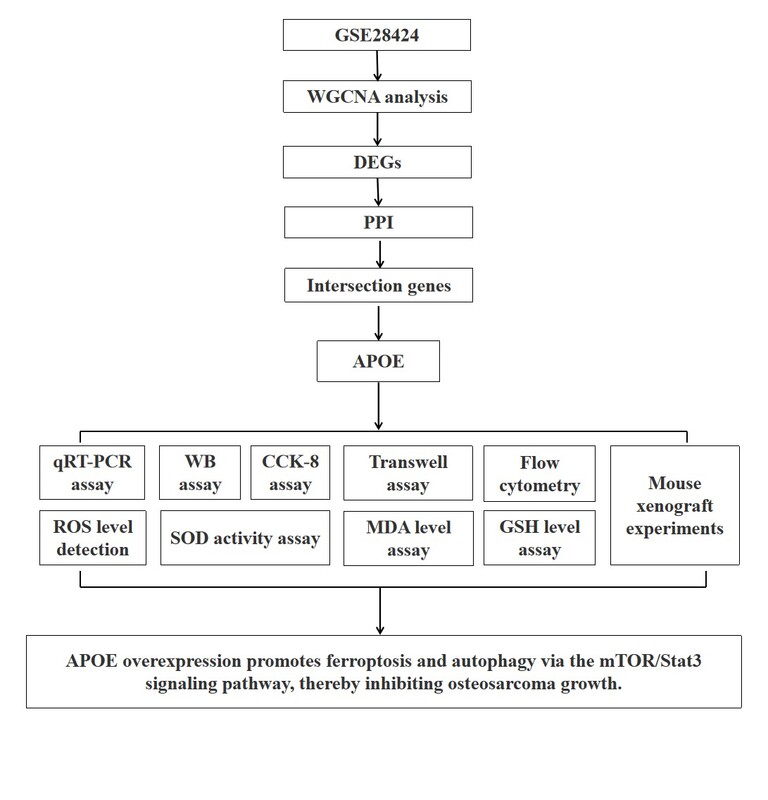Current issue
Archive
Manuscripts accepted
About the Journal
Editorial office
Editorial board
Section Editors
Abstracting and indexing
Subscription
Contact
Ethical standards and procedures
Most read articles
Instructions for authors
Article Processing Charge (APC)
Regulations of paying article processing charge (APC)
BIOLOGY MOLECULAR / RESEARCH PAPER
APOE suppresses osteosarcoma by modulating ferroptosis through the mTOR/Stat3 signaling pathway
1
Minhang Hospital, Fudan University, China
These authors had equal contribution to this work
Submission date: 2024-09-27
Final revision date: 2025-03-06
Acceptance date: 2025-04-13
Online publication date: 2025-04-20
KEYWORDS
TOPICS
ABSTRACT
Introduction:
Osteosarcoma (OS) is a highly malignant bone tumor with limited treatment options. The role of Apolipoprotein E (APOE) in OS remains unclear. This study explores the impact of APOE overexpression on OS, particularly its effects on ferroptosis and autophagy.
Material and methods:
APOE was identified as a key gene through weighted gene co-expression network analysis (WGCNA) and protein-protein interaction (PPI) network analysis of the GSE28424 dataset. APOE was overexpressed in OS cell lines to evaluate its effects on cell behavior. The role of autophagy was investigated using the autophagy inhibitor 3-MA. The involvement of ferroptosis and the mTOR/Stat3 signaling pathway was investigated utilizing Quantitative real-time reverse transcription PCR (qRT-PCR), Western blot (WB), and flow cytometry. A mouse xenograft model was employed to validate the in vitro results.
Results:
APOE overexpression significantly inhibited OS cell proliferation, invasion, migration, and epithelial-mesenchymal transition (EMT), with 3-MA partially reversing these effects. APOE overexpression also inhibited the mTOR and Stat3 expression, enhancing autophagy, as shown by increased LC3B-1, LC3B-2, and Beclin1 expression. Additionally, APOE overexpression promoted apoptosis, associated with increased reactive oxygen species (ROS) and intracellular Fe²⁺ levels, and altered ferroptosis-related gene expression, including upregulation of TfR1 and downregulation of FPN, GPX4, and SLC7A11. In vivo, APOE overexpression in a mouse xenograft model resulted in significantly smaller tumors, with changes in autophagy and ferroptosis markers consistent with in vitro findings.
Conclusions:
APOE overexpression suppresses osteosarcoma growth by promoting ferroptosis and autophagy through the mTOR/Stat3 signaling pathway, highlighting its promise as a target for OS therapeutic intervention.
Osteosarcoma (OS) is a highly malignant bone tumor with limited treatment options. The role of Apolipoprotein E (APOE) in OS remains unclear. This study explores the impact of APOE overexpression on OS, particularly its effects on ferroptosis and autophagy.
Material and methods:
APOE was identified as a key gene through weighted gene co-expression network analysis (WGCNA) and protein-protein interaction (PPI) network analysis of the GSE28424 dataset. APOE was overexpressed in OS cell lines to evaluate its effects on cell behavior. The role of autophagy was investigated using the autophagy inhibitor 3-MA. The involvement of ferroptosis and the mTOR/Stat3 signaling pathway was investigated utilizing Quantitative real-time reverse transcription PCR (qRT-PCR), Western blot (WB), and flow cytometry. A mouse xenograft model was employed to validate the in vitro results.
Results:
APOE overexpression significantly inhibited OS cell proliferation, invasion, migration, and epithelial-mesenchymal transition (EMT), with 3-MA partially reversing these effects. APOE overexpression also inhibited the mTOR and Stat3 expression, enhancing autophagy, as shown by increased LC3B-1, LC3B-2, and Beclin1 expression. Additionally, APOE overexpression promoted apoptosis, associated with increased reactive oxygen species (ROS) and intracellular Fe²⁺ levels, and altered ferroptosis-related gene expression, including upregulation of TfR1 and downregulation of FPN, GPX4, and SLC7A11. In vivo, APOE overexpression in a mouse xenograft model resulted in significantly smaller tumors, with changes in autophagy and ferroptosis markers consistent with in vitro findings.
Conclusions:
APOE overexpression suppresses osteosarcoma growth by promoting ferroptosis and autophagy through the mTOR/Stat3 signaling pathway, highlighting its promise as a target for OS therapeutic intervention.
Share
RELATED ARTICLE
We process personal data collected when visiting the website. The function of obtaining information about users and their behavior is carried out by voluntarily entered information in forms and saving cookies in end devices. Data, including cookies, are used to provide services, improve the user experience and to analyze the traffic in accordance with the Privacy policy. Data are also collected and processed by Google Analytics tool (more).
You can change cookies settings in your browser. Restricted use of cookies in the browser configuration may affect some functionalities of the website.
You can change cookies settings in your browser. Restricted use of cookies in the browser configuration may affect some functionalities of the website.



